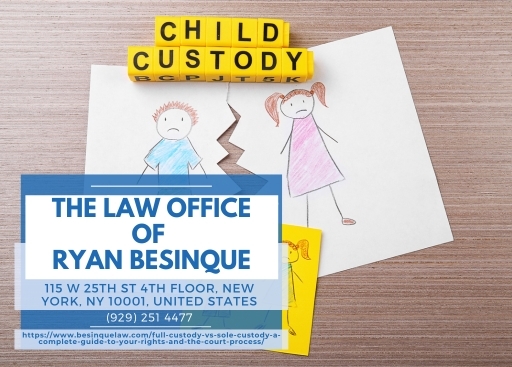Ryan Besinque (https://www.besinquelaw.com/full-custody-vs-sole-custody-a-complete-guide-to-your-rights-and-the-court-process/), a New York City child custody lawyer, provides a detailed and practical look into one of the most misunderstood custody topics in New York family law: the difference between full custody and sole custody. In the article titled “Full Custody vs. Sole Custody: A Complete Guide to Your Rights and the Court Process”, Besinque outlines the legal definitions, practical implications, and court procedures associated with sole custody arrangements. As part of The Law Office of Ryan Besinque, he aims to offer clarity on what parents can expect when pursuing custody through New York’s legal system.
In New York, custody is divided into legal and physical categories. Ryan Besinque, as a New York City child custody lawyer, explains that legal custody refers to the right to make significant decisions about the child’s life, such as healthcare and education, while physical custody determines where the child primarily lives. The term “full custody” is not used in legal documents; instead, courts speak in terms of sole legal custody and sole physical custody. When someone requests “full custody,” they are typically asking for both.
Ryan Besinque, as a New York City child custody lawyer, emphasizes that sole custody is not intended to exclude the non-custodial parent from the child’s life. Instead, it’s a legal designation that identifies who will make the major decisions and who will provide the day-to-day care. Courts in New York generally support visitation rights for the non-custodial parent, unless there is a compelling reason, such as a threat to the child’s safety, not to allow it. “Even if one parent is awarded sole custody, the other parent may still retain certain rights, such as visitation or access to school and medical records,” Besinque explains.
A key element in all custody decisions is the court’s commitment to the child’s best interests. The New York City child custody lawyer highlights that judges consider a range of factors, including the stability of each home environment, past caregiving roles, willingness to foster a relationship with the other parent, and, when appropriate, the child’s own wishes. Domestic violence, substance abuse, and mental health issues are also critical considerations, especially when determining if supervised visitation is necessary.
In terms of process, Besinque details how a parent—or even a qualified non-parent—can initiate a custody petition in Family Court. This involves filing paperwork, serving the other parent, attending multiple court appearances, and potentially participating in mediation or trial. If parents cannot agree, the judge will issue a final order based on testimony, evidence, and the child’s best interests. The court may also appoint an Attorney for the Child to represent the child's preferences or welfare.
Temporary orders may be issued early in the process to define living arrangements and visitation while the case is ongoing. These interim decisions can influence final rulings, making early hearings significant. If circumstances change later, such as a move, new job schedule, or concerns about the child's safety, a parent can request a modification. However, such changes must be substantial and show that the new arrangement would benefit the child.
Ryan Besinque emphasizes the importance of a clear understanding and preparation when filing for sole custody. He notes that judges expect strong evidence to support why one parent should have sole legal or physical custody. The court does not automatically favor one parent over the other, and both parties begin with equal legal rights until a formal custody order is issued.
Sole custody arrangements do not strip the non-custodial parent of all rights. Rather, they centralize decision-making and caregiving responsibilities with one parent for the sake of stability. Even under an Order of Protection, the courts often create exceptions to allow for child exchanges and maintain parent-child relationships, further reflecting the system’s focus on the child’s welfare over parental disputes.
The Law Office of Ryan Besinque works with families navigating these difficult decisions and legal standards. The firm focuses on helping parents achieve legal custody outcomes that promote consistent, nurturing environments for their children. Whether pursuing custody through Family Court or responding to an existing petition, Besinque's guidance is grounded in New York custody law and tailored to each family's situation.
For those facing custody disputes or planning to file for sole custody in New York, understanding the terminology, legal process, and court standards is essential. This article offers a practical foundation and reflects Ryan Besinque’s commitment to helping parents advocate effectively within the system.
About The Law Office of Ryan Besinque:
The Law Office of Ryan Besinque is a New York-based family law firm assisting clients with matters such as custody, visitation, divorce, and family court proceedings. The firm provides legal support for parents navigating the New York custody process with a focus on promoting outcomes that reflect the best interests of the child.
Embeds:
Youtube Video: https://www.youtube.com/watch?v=CK7BckjrKhk
GMB: https://www.google.com/maps?cid=3422990479581259264
Email and website
Email: ryan@besinquelaw.com
Website: https://www.besinquelaw.com/
Media Contact
Company Name: The Law Office of Ryan Besinque
Contact Person: Ryan Besinque
Email: Send Email
Phone: (929) 251-4477
Address:115 W 25th St 4th floor
City: New York
State: New York 10001
Country: United States
Website: https://www.besinquelaw.com/





